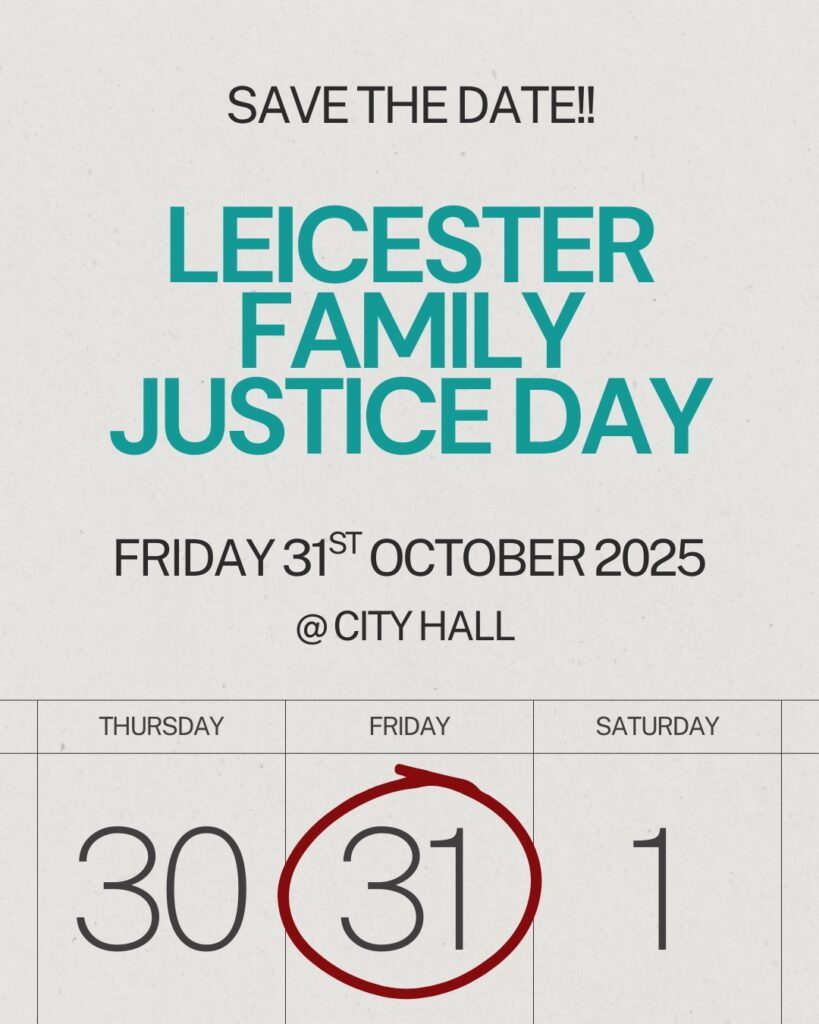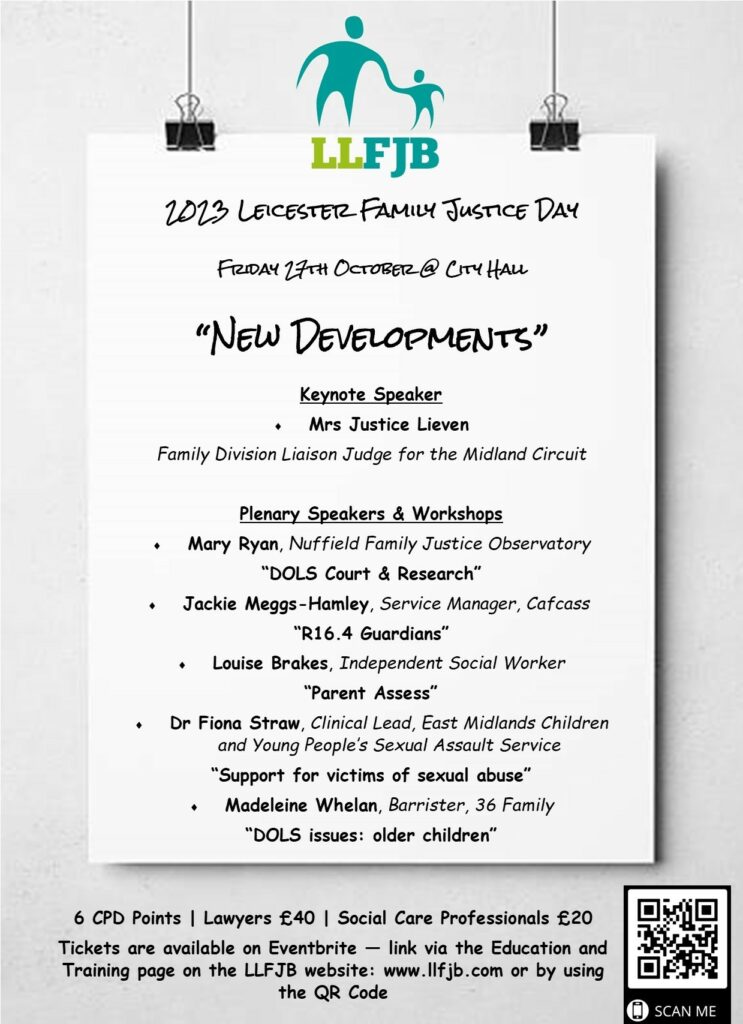Leicester Family Justice Day 2025
This year’s conference will take place on 31st October 2025, please save the date. More details to follow.

This year’s conference will take place on 31st October 2025, please save the date. More details to follow.

Our annual Family Justice Day is now available to book. It will be held at the City Hall on Friday 27th October 2023 and will feature Midlands FDLJ Lieven J as our keynote speaker.
Booking via Eventbrite here: https://www.eventbrite.co.uk/e/2023-leicester-family-justice-conference-tickets-717851241387?aff=oddtdtcreator

Professor Schofield of the University of East Anglia has authored seminal research into the realities of long-term foster care as a permanence outcome. This permanence outcome increasingly requires closer and more realistic analysis, and we are delighted that Prof. Schofield will deliver a zoom seminar on her research.
Here is the zoom link:
Please see the link below to register for the Webinar on the 21st of September.
You are invited to a Zoom webinar.
When: Sep 21, 2023 04:30 PM London
Topic: Long-Term Foster Care Webinar
Register in advance for this webinar:
Meeting ID:
Meeting ID: 854 5631 8122
Passcode: 474273
Passcode: 474273
After registering, you will receive a confirmation email containing information about joining the webinar.
We intend to record this seminar and post it on the LLFJB website.
Read MoreDownload the full programme for the day here.
Booking is now open: https://www.eventbrite.co.uk/e/leicester-family-justice-day-2022-new-beginnings-tickets-430367880917
Read More
We were delighted to welcome so many delegates to our annual Family Justice Day on 29th October 2021. Entitled Recovery and Progress: A Shifting Kaleidoscope, we continued our long tradition of hosting a number of excellent speakers who delivered insightful and engaging sessions.
Our Designated Family Judge Her Honour Judge George opened the day by welcoming the delegates, telling us how glad she was to finally be able to meet and share ideas face to face once again. She thanked the Education Sub-Committee for their hard work in organising the day.
Mrs Justice Nathalie Lieven, Family Division Liaison Judge for the Midlands Circuit, delivered the keynote address. She focussed on the efforts which need to be made across the board to recover the backlog of cases caused by the pandemic, to make the whole system more efficient and to stem the tide of private law disputes which ought not to come before the Family Court in the first place. As she said, “if we don’t get each bit of the system working, none of it works”.
Lieven J struck a positive note, reflecting that, as we emerge from the pandemic, there is an opportunity for new ideas to come to the fore. She said that crises always make people think about and question how they had been doing things, so now is the time to look at family justice and ask “Why are we doing that?”. She did recognise that what is required is a cultural shift, however there are many things we can do now to improve, such as:
The High Court Judge highlighted the need for practitioners in all areas of the system to work together and to give honest feedback about what is or is not working. She explained that there is still no clear consensus as to the best way forwards post-pandemic and to which elements of remote working we should retain. However, we ought to be prepared to attend court if required and need to remain mindful of the needs of clients when listing hearings.
Lieven J moved to touch upon three other important areas of reform. The first is the need for local areas to begin to implement the recommendations of the Family Solutions Group and to arrange parenting hubs which can provide multi-agency support in order to divert private law disputes away from court. The second was the publication today of the President’s Transparency Review and her clear wish to support him in improving openness in the family justice system: in her view “closed justice is no justice at all”. Finally, the FDLJ explained the principal reforms which will be introduced by the Domestic Abuse Act 2021.
Following their recent Family Law article “The Family Solutions Initiative – a response to a system in crisis”, Martin Kingerley QC and Karen Barham gave an in-depth presentation on the recommendations of the Family Solutions Group “What about me?” report. Focussing on both the long and short term recommendations, they explained that there is a need for a public shift away from “blame culture” in order to encourage separated families to resolve any conflict outside the sphere of litigation. Public education is required, as is the implementation of a framework of support for children and young people affected by parental separation.
There are many steps which family law practitioners can take now to improve outcomes for their clients. The working group has recommended mandatory training for lawyers undertaking children work. We must begin to shift our language away from the language of conflict to the language of solutions. Judicial training and enforcement of Part 3 of the Family Procedure Rules is required immediately.
The speakers explained the many initiatives underway to improve and develop out-of-court dispute solutions which meet the many and varied needs of separated families, such as Parenting Co-ordinators, The Certainty Project, The Divorce Surgery and the options for moulding the mediation model to the needs of clients, including hybrid, blended, virtual and shuttle mediation.
Karen set out her proposals for the introduction of a Part 3 Protocol, designed to strengthen the judicial powers of encouragement towards out-of-court solutions.
The speakers also touched upon the need for the implementation of local separated families alliances, including online information hubs. We have today launched our Support for Separated Families page which we hope to grow over the coming months to incorporate all of the agencies and providers who will form part of our local alliance.
Following a welcome coffee break, we heard from Stephanie McBurney and Mark Fitzgerald from the Safer Leicester Partnership on “Learning from Leicester Domestic Homicide Reviews”. The speakers explained the process of local DHRs and how the Partnership uses the review process to make recommendations for change in order to reduce the risk of fatal familial and intimate partner violence in the future. We looked at some common themes which have emerged and considered how research such as the Eight Stage Homicide Timeline can assist practitioners to identify risk factors and safeguard potential victims accordingly.
We then broke out into workshop sessions.
Consultant Forensic Social Worker and Criminologist Dr Craig Barlow delivered a seminar on the best practice for the use of achieving best evidence interviews and how they can be deployed to assist the Family Court. His helpful workshop took delegates through the evolution of the ABE process and gave valuable advice about what we ought to expect from interviewers.
Consultant Forensic Psychologist Gillian Merrill hosted an engaging seminar which explained how practitioners could better understand and meet the needs of young people or clients with attention deficit hyperactivity disorder and autistic spectrum disorder.
Professor Mandy Burton delivered an important workshop highlighting the outcomes from the 2020 Harm Report “Assessing Risk of Harm to Children and Parents in Private Law Cases”, providing many learning points for practitioners in all areas of the family justice system.
Unfortunately, Beverley Barnett-Jones was unable to attend today due to unforeseen circumstances, but we hope that she will be able to deliver her workshop on post-adoption contact online soon.
As ever, we thank the Committee members Ben Mansfield, Fiona Gingell, Della Philips, Kate Reeves, Margaret Robinson, Keeley Lee and Luke Dickinson for their sterling efforts in organising such a valuable training day, as well as the Leicester County Court staff for their invaluable assistance. We also thank Dodds Solicitors for arranging the raffle in support of Leicester Children’s Holidays.
Slides from the various presentations and workshops will be available for download shortly.
We would appreciate it if delegates could leave us feedback in the forms provided and we look forward to seeing you all again next year.
Read MoreThank you to everyone who joined our Public Law Outline webinar today; we had over 240 delegates so we hope you all found the training useful. The session covered a range of topics including the revised PLO pre-proceedings process, guidance on the use of accommodation under section 20 of the Children Act, case management requirements and guidance on the use of Special Guardianship Orders. If you were not able to join us today, we strongly recommend that you watch the webinar recording and review the associated materials if possible.
Click here to view the webinar recording (note: wait for Recording 2 which begins after around 30 seconds).
The Powerpoint slides can be downloaded here.
The Report of the Public Law Working Group and all of the associated materials are available here.
With thanks to host Her Honour Judge George, our Education Sub-Committee Chair Ben Mansfield, and speakers Alison Myers of Leicester City Council, Nadia Mansfield and Siân Waldron, with special thanks to our final speaker Claire Howell for her impressive display of multi-tasking.
Read More
Tickets are now available for our 2021 Family Justice Day. Book here.
Read More
HHJ George will be hosting a training webinar for all local judiciary and practitioners on Friday 24th September at 2pm. The webinar will focus on the upcoming reforms to public law cases in light of the recommendations of the Public Law Working Group.
Further details to follow closer to the time.
Read MoreLeicester DFJ HHJ George’s short Newsletter of June 2021 regarding the rollout of the Digital Care Platform (or FPL) is available for download here:
Read MoreLeicester DFJ HHJ George’s May 2021 Newsletter is available to download here:
Please note that, sadly, due to the lifting of Covid restrictions having been delayed for a further four weeks, the picnic has been postponed until Friday 23rd July at 4:30pm.
The new standard orders and templates which follow the recommendations of the Public Law Working Group are available for download from the Public Law area of our INFORMATION CENTRE.
HHJ George encourages all public law practitioners to watch the recent FLBA webinar presented by the Honourable Mr Justice Keehan and Hannah Markham QC (FLBA Vice Chair, The 36 Group), including a summary of the Special Guardianship Reforms presented by Dr John Simmonds (Director of Policy, Research and Development, CoramBAAF), chaired by Leslie Samuels QC.
The webinar is accessible here with the password 5tq$wO%5:
FLBA Case Management and Template Orders Webinar
Read More
